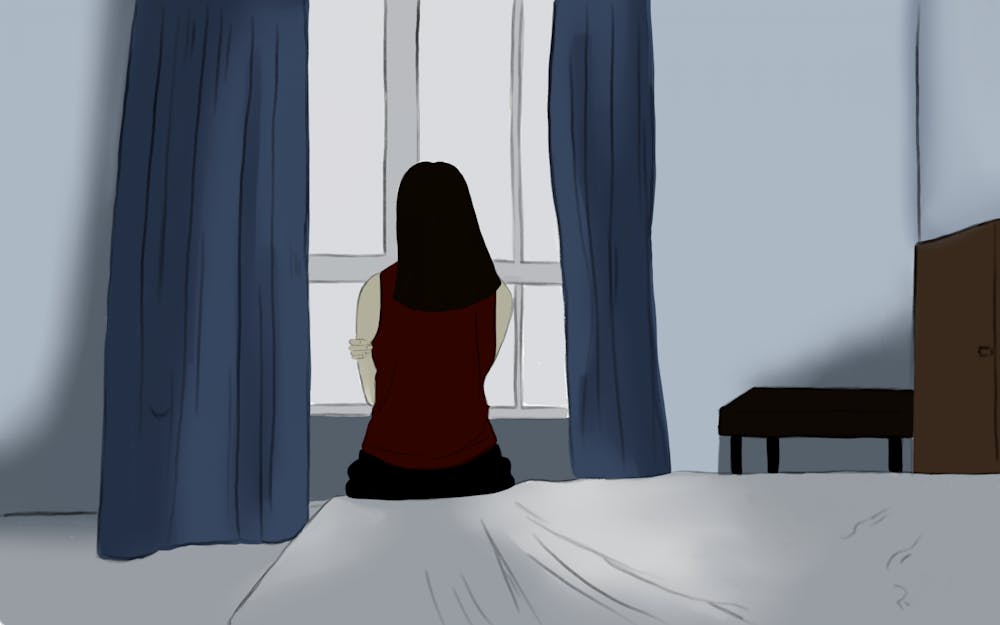I spent most of the early days of the COVID-19 pandemic like many other financially-dependent college students — alone in my hometown with my parents as my only source of human interaction. Though I’m perhaps not as embarrassed as I should be to admit they’re my best friends, another part of me ached for alternative social outlets.
What was designed to be an introvert’s dream became our worst nightmare, as text messaging and phone calls gradually lost their luster and proved themselves more tedious than any in-person gathering. I eventually abandoned electronic forms of communication altogether and had more than 20 unread text messages at one time, a personal record for someone with anxiety.
As mass vaccination approaches, I feel relieved like most others. However, I cannot help but question the lingering effects of remote communication and whether it will hinder my ability to reach out to friends, even physically, going forward.
Because I rely heavily on others to make plans and pioneer conversations, I assumed interacting remotely would be no different. I quickly found physical distancing to be much more isolating than I could’ve imagined. In instances where I was either asked to express myself or forced to initiate, I couldn’t do it.
Being told to “just reach out” when you’re feeling down, although well intentioned, can be draining and sometimes ineffective. Because being shy hinges upon finding social functions and being outgoing emotionally taxing, it’s unsurprising this makes me, like many other introverts, panicked.
Though introversion and social anxiety are not inherently correlated, they’re not mutually exclusive either.
Because the brain responds identically to real and unreal danger, individuals are left independently to distinguish legitimate concern from aimless feelings of fear, according to a 2014 Anxiety.org article written by Angela Retano, a psychiatric-mental health nurse practitioner. The more exposure a person has to events they perceive as threatening — or the more emotionally sensitive they are to them — the more likely they may be to develop an anxiety disorder.
As I experience more social discomfort, I become more afraid to reveal my inner-most thoughts and engage with friends and acquaintances alike, making distaste for interaction all the more palpable.
This desire for human intimacy, coupled with a fear of closeness in my relationships, can leave me feeling like that meme highlighting the dichotomy between being understood and what it takes to actually get there.
I want my friends to understand and help with intense feelings of grief, loneliness or depression, but when they're right in front of me waiting to listen, I freeze. I’m afraid they will not understand or will judge my transparency. I’ve waited my entire life to have friends like those I have now, and I would never want them to think I’m anything less than perfect.
So, in such instances when a friend reaches out to me and asks “how’s it going?” or “how are you doing?” my immediate response is “oh I’m fine.” I’m very rarely fine and live my life as a beacon of pure emotion, so though thinly-veiled as this may seem, it does often work in hiding my true feelings. I perpetuate my mellow and lighthearted external personality to retain friendships I believe are fragile. Unfortunately, this false sense of fragility is one of those funny tricks anxiety will play on you.
I have plenty of work to do in allowing myself to be more revealing to those I care about who I know care about me, but I ask a simple favor of my extraverted peers: Please stop asking us how we’re doing — especially through text. Please force me to tell you what’s going on in my life, either with a specific request or a phone call. Say “I want to hear about your day,” or “Tell me what’s bothering you right now,” instead.
That way, I’ll have nowhere to hide.
Introverts will find sneaky ways to allow some of their inner feelings to leak out, forcing others to dig deeper for the full picture. We do this to ensure those we reach out to will truly have our best interests at heart, and so we don’t waste our precious social time on people we might find unfulfilling.
Please stop telling me I’m strong just because I deal with things independently. Though I’d rather get my teeth cleaned than be perceived by others, I secretly wish to be understood by the people I love, just as much as anybody else. The pandemic didn’t change this desire, but it certainly made it all the more tangible.
Natalie Gabor (she/her) is a junior studying journalism with minors in business marketing and philosophy. She hopes to one day find a career that tops her brief stint as a Vans employee.





